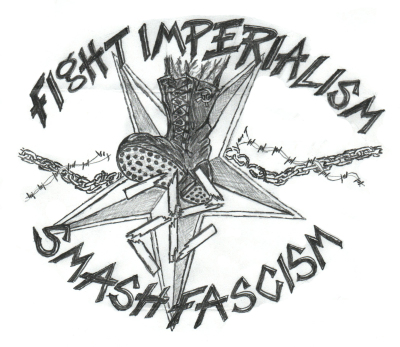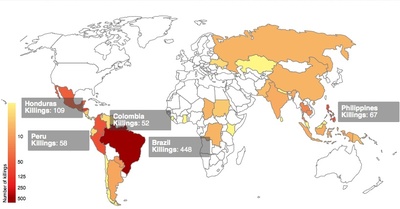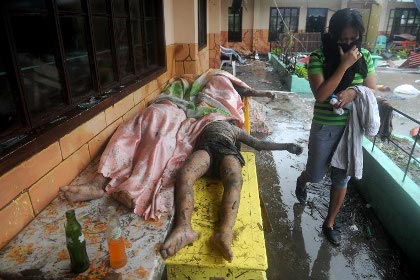
Strategizing Against Fascism

Our readership has always talked about fascism more than the mainstream because they face some of the most fascistic aspects of imperialism within U.$. borders. As the dialogue around fascism in relation to the White House enterslj6 the mainstream, it becomes more important for us to distinguish our line, and the potential strategies that follow from that line.(1)
The first draft of an article on the self-determination of the Lakota people referred repeatedly to the fascism that they faced. The parallel is certainly justified. As we know Hitler was very inspired by the Amerikan genocide and colonization of First Nations. Yet, fascism arose hundreds of years after settlers first came to Turtle Island. There are many similarities, but also differences, between Nazi Germany and the early United $tates, and the United $tates today.(2) Understanding what fascism is is important for fighting it.
Fascism as Inter-Imperialist Conflict
“Marxist-Leninists eventually argued that fascism is qualitatively more evil than ordinary imperialism. First, fascism occupied imperialist countries and exterminated national self-determination in direct ways that the other imperialists did not. Second, and less important, fascism is the open dictatorship of the bourgeoisie instead of just the more masked dictatorship of bourgeois democracy.” MC5, May 1993, “Historical applications of Line, Strategy and Tactics: The United Front”, MIM Theory 6: The Stalin Issue, p.76. ($5)
MC5 goes on to say that the principal contradiction during the period of the rise of fascism was actually that between the socialist and the imperialist camps. That the Nazis focused so much on the destruction of the Soviet Union, undermining their own success, demonstrates the role of fascism as a response to socialism.
Stalin’s strategy in this period was to divide the imperialist camp. It’s hard to see how the socialist camp today could employ such a strategy since we are not operating from the base of power that Stalin was (the USSR actually had the military might to stop the Nazis). But in his time, Stalin’s strategy proved correct.
A Global Threat or Bourgeois Politics
Antifa and the unorganized rebellions against the police in cities across the country have forced anti-fascism into the mainstream. Yet the mainstream rhetoric has quickly transformed the “battle against fascism” in the United $tates into a thinly veiled campaign for the Democratic Party presidential election in November. The likes of Bob Avakian, Angela Davis and Noam Chomsky have all called on people to vote for Joe Biden, citing this battle.
Stopping fascism is a lower level goal than ending imperialism or building socialism. There are times, like World War II, when stopping fascism is the appropriate focus for communists. At that time fascism was waging a military assault across Europe and threatening the first dictatorship of the proletariat.
Presidential candidate Biden has already promised a significant increase in military spending, and President Trump has increased military spending during his term, despite his criticisms of the self-interest of the military industrial complex. Both candidates are clearly behind continued U.$. militarism to wage war against the oppressed peoples of the world. Neither candidate has indicated a rapacious military campaign to conquer and occupy other nations. Between the two options offered by the U.$. imperialists, we do not yet see the principal characteristic that led the communists of the COMINTERN to see fascism as a greater evil than imperialism.
Those who are crying “fascism” in the U.$. today are arguing that state repression internal to the United $tates is ramping up. So let’s look at what MC5 called the “less important” distinguishing characteristic of fascism.
The Democratic Struggle Against Fascism in the Third World
“The imperialists export fascism to many Third World countries via puppet governments. And imperialist countries can turn to fascism themselves. But it is important to note that there is no third choice for independent fascism in the world: they are either imperialist or imperialist-puppets. Germany, Spain, Italy and Japan had all reached the banking stage of capitalism and had a real basis for thinking they could take over colonies from the British and French. … The vast majority of the world’s fascist-ruled countries have been U.$. puppets.” – MIM Congress, “Osama Bin Laden and the Concept of ‘Theocratic Fascism’”, 2004
Strategy varies from place to place. An example of this from the past is when the Filipinos waged a campaign against the GATT trade agreement. In the Philippines this was a righteous campaign against imperialist control over their economy. However, in the United $tates the campaign against GATT was one focused on protecting Amerikan jobs, which implies fortifying imperialist borders against labor from other countries. So you can see how the same campaign can have very different impacts in different contexts. It is our responsibility to understand our own context and organize accordingly.
In a previous article on this same topic, we mentioned the anti-imperialist rhetoric of the newly elected President Duterte in the Philippines. After Duterte’s anti-United $tates rhetoric fizzled, the National Democratic Front in the Philippines have begun campaigning against the “fascist US-Duterte regime.” This framing is important. The fascism is coming from the United $tates and being implemented by the puppet Duterte. This allows for their propaganda to be consumed within the United $tates without fueling U.$. militarism for an invasion of the Philippines to rescue them from fascism.
This is in sharp contrast to the rhetoric around “islamo-fascism” in Afghanistan following the 9/11 attacks on the World Trade Center and the Pentagon. This framing was of course propagated by the Pentagon, but also by many calling themselves “communists.” It fueled anti-Muslim sentiments in support of U.$. militarism in Central Asia.
The framing of fascism in the form of puppet regimes is useful for the national democratic movements in the Third World to unite all who can be united. But these puppet regimes do not signify a shift in the global balance of power that warrant a strategic re-orientation like the rise of fascism within an imperialist country would.
Don’t Vote, Build Bases of Power
Another important point to note is that there is an active People’s War in the Philippines. The National Democratic Front is led by the communist party. The united front to get Trump out of office is led by the Democratic Party, in other words, the imperialists. The imperialists are not facing the threat of a communist revolution in the United $tates like they are in the Philippines that would warrant a shift to outright bourgeois dictatorship.
The imperialists responded to the 9/11 attacks with a series of changes in law, such as the Patriot Act, which legalized some of the things Trump has been doing domestically. Initially, MIM was part of the movement to oppose the Patriot Act. However, they decided to leave that movement when it was clear it was dominated by libertarians. Other “communists” tailed this movement with calls to “Drive out the Bush regime” often referring to Bush as a fascist. These same “communists” who were effectively campaigning for Obama’s election by offering no other alternative to Bush, because they have no power, are now openly endorsing Biden.
When the Soviet Union allied with the United $tates, and the Filipino communists ally with the bourgeois forces, they do not put down their guns, or give up their goals of building socialism. To be real players in the anti-fascist struggle, we must first build power like the Soviet Union did and the Filipinos are doing. Stalin did bite his tongue about U.$. imperialism to defeat German fascism. To bite our tongue today about Joe Biden’s militarism and targeting of oppressed nations with mass incarceration is to abandon the oppressed nations of the world.
It is good to see those in the imperialist state defending bourgeois democracy. That is their role. Our role is to build public opinion against imperialism and build independent institutions of the oppressed. As Trump attempts to frame Biden/Harris as the radical left, it is important to demonstrate real revolutionary politics in this country. And the target of the revolution is imperialism. Imperialism must be overthrown before we can really begin the task of building a society without oppression. To put this goal to the side to focus on getting Trump out of office, especially at a time when more and more people are looking for systemic change, is to stop representing the international proletariat. In this era in the United $tates, anti-imperialism is the radical position, while anti-fascism and anti-racism are the reformist positions.
Notes:
1. order MIM Theory 5: Diet for a Small Red
Planet ($5) for an in-depth look at the relationship between line,
strategy and tactics
2. order our Fascism and Contemporary Economics
($3) for a deeper look at the history and economic of
fascism









